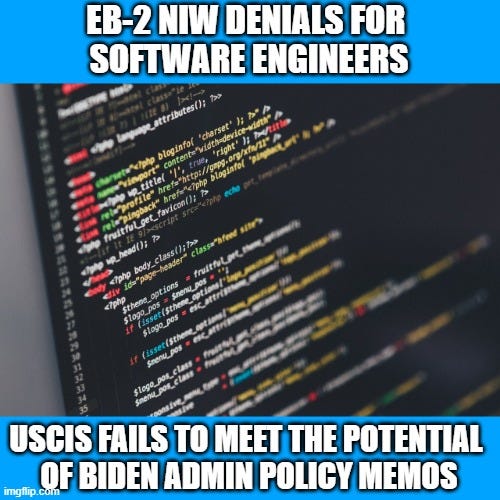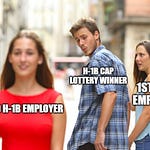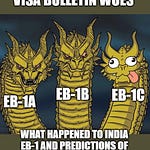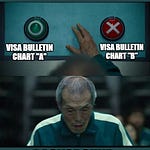Matter of NYSDOT - 1998
Matter of Dhanasar - December 2016
Biden Administration Policy Memo - January 2022
Update on USCIS Policy Manual - January 2022
“USCIS recognizes the importance of progress in STEM fields… especially in focused critical or emerging technologies… To identify a critical and emerging technology field, officers should consider governmental, academic, and other authoritative and instructive sources…”
Go back to the text of Matter of Dhanasar
Compare the language of RFEs and Denial Decisions
Why this change? —- “Pigs get fat, and hogs get slaughtered.”
Massive layoffs at tech companies.
Slow processing of PERM labor certification applications.
Availability of premium process for EB-2 NIW.
The limited number of H-1B visas available in the H-1B cap.
Chapter 5, including Footnotes 64-69.
Specific Evidentiary Considerations for Persons with Advanced Degrees in Science, Technology, Engineering, or Mathematics (STEM) Fields
There are specific evidentiary considerations relating to STEM degrees and fields, although the analysis is the same regardless of endeavor, so these considerations may apply in non-STEM endeavors where the petitioner demonstrates that such considerations are applicable.[64] USCIS recognizes the importance of progress in STEM fields and the essential role of persons with advanced STEM degrees in fostering this progress, especially in focused critical and emerging technologies[65] or other STEM areas important to U.S. competitiveness[66] or national security.[67]
To identify a critical and emerging technology field, officers consider governmental, academic, and other authoritative and instructive sources, and all other evidence submitted by the petitioner. The lists of critical and emerging technology subfields published by the Executive Office of the President, by either the National Science and Technology Council or the National Security Council, are examples of authoritative lists.[68] Officers may find that a STEM area is important to competitiveness or security in a variety of circumstances, for example, when the evidence in the record demonstrates that an endeavor will help the United States to remain ahead of strategic competitors or current and potential adversaries, or relates to a field, including those that are research and development-intensive industries,[69] where appropriate activity and investment, both early and later in the development cycle, may contribute to the United States achieving or maintaining technology leadership or peer status among allies and partners.
With respect to the first prong, as in all cases, the evidence must demonstrate that a STEM endeavor has both substantial merit and national importance. Many proposed endeavors that aim to advance STEM technologies and research, whether in academic or industry settings, not only have substantial merit in relation to U.S. science and technology interests, but also have sufficiently broad potential implications to demonstrate national importance. On the other hand, while proposed classroom teaching activities in STEM, for example, may have substantial merit in relation to U.S. educational interests, such activities, by themselves, generally are not indicative of an impact in the field of STEM education more broadly, and therefore generally would not establish their national importance.[70]
For the second prong, as mentioned above, the person’s education and skillset are relevant to whether the person is well positioned to advance the endeavor.[71] USCIS considers an advanced degree, particularly a Doctor of Philosophy (Ph.D.), in a STEM field tied to the proposed endeavor and related to work furthering a critical and emerging technology or other STEM area important to U.S. competitiveness or national security, an especially positive factor to be considered along with other evidence for purposes of the assessment under the second prong.[72]
Persons with a Ph.D. in a STEM field, as well as certain other persons with advanced STEM degrees relating to the proposed endeavor, have scientific knowledge in a narrow STEM area since doctoral dissertations and some master’s theses concentrate on a particularized subject matter. Officers should then consider whether that specific STEM area relates to the proposed endeavor. Even when the area of concentration is in a theoretical STEM area (theoretical mathematics or physics, for example), it may further U.S. competitiveness or national security as described in the proposed endeavor.
Examples of evidence that can supplement the person’s education are listed above,[73] but a petitioner may submit any relevant evidence, including letters from interested government agencies as discussed below,[74] to show how the person is well positioned to advance the proposed endeavor. A degree in and of itself, however, is not a basis to determine that a person is well positioned to advance the proposed endeavor.
Finally, with respect to the third prong, it is the petitioner’s burden to establish that factors in favor of granting the waiver outweigh those that support the requirement of a job offer and thus a labor certification.
When evaluating the third prong and whether the United States may benefit from the person’s entry, regardless of whether other U.S. workers are available (as well as other factors relating to prong three discussed above, such as urgency), USCIS considers the following combination of facts contained in the record to be a strong positive factor:
The person possesses an advanced STEM degree, particularly a Ph.D.;
The person will be engaged in work furthering a critical and emerging technology or other STEM area important to U.S. competitiveness; and
The person is well positioned to advance the proposed STEM endeavor of national importance.
The benefit is especially weighty where the endeavor has the potential to support U.S. national security or enhance U.S. economic competitiveness, or when the petition is supported by letters from interested U.S. government agencies as discussed in section 3 below.
Limited federal court review: Poursina v. USCIS.
So going into January 2025, what cases can get approved?















Share this post